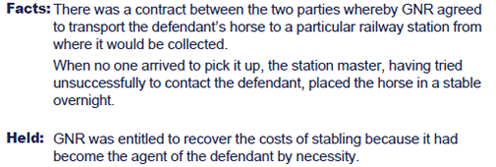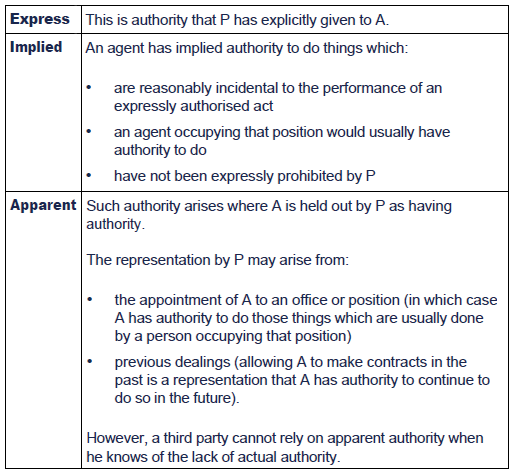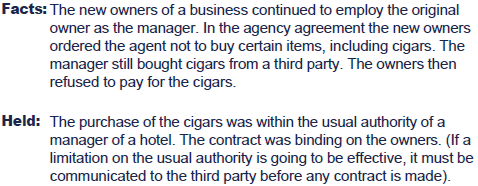Chapter 5: International business forms – agency
Chapter learning objectives
Upon completion of this chapter you will be able to:
- define the role of the agent and give examples of such relationships, paying particular regard to partners and company directors
- explain how the agency relationship is established
- define the authority of the agent
- explain the potential liability of both principal and agent.
1 Definition of an agent
 An agent (A) is a person who has been authorised, either expressly, byconduct or by implication, to act for another party which is called thePrincipal (P). The agent is making and entering into legal relationswith a third party on behalf of the principal. The resulting contractsare therefore made between the Principal and the third party and notdirectly with the agent.
An agent (A) is a person who has been authorised, either expressly, byconduct or by implication, to act for another party which is called thePrincipal (P). The agent is making and entering into legal relationswith a third party on behalf of the principal. The resulting contractsare therefore made between the Principal and the third party and notdirectly with the agent.
The role of agency in modern commercial transactions issignificant. Commercial life would be very burdensome if every deal hadto be done in person. Also, the invention of artificial legal entitiessuch as private and public companies with separate legal personality andlimited liability partnerships necessitated the use of agents as thecompanies or LLP cannot act by themselves.

 Illustration 1 – Definition of an agent
Illustration 1 – Definition of an agent
An agency relationship exists in lots of situations:
- A director acts as an agent for his company.
- A partner acts as an agent for his partnership.
- An estate agent is appointed by a seller of a house to find a buyer.
- A travel agent is appointed by a holiday company to make bookings with customers.

2 How the agency relationship arises
Introduction
An agency relationship can be established in one of five ways:
- express agreement
- implied agreement
- necessity
- ratification
- estoppel.
Express agreement
This is where P actually appoints A as his agent. The agreement can be made orally or in writing.
Implied agreement
This is where P has not expressly agreed that A should be hisagent. However, the agreement can be implied from the parties' conductor relationship.
Necessity
This requires four conditions to be satisfied:
- P's property is entrusted to A
- an emergency arises making it necessary for A to act
- it is not possible to communicate with P
- A acts in the interest of P.
Great Northern Railway v Swaffield (1874)

Ratification
If a properly appointed agent exceeds his authority, or a personhaving no authority purports to act as an agent, the principal has noliability on that contract unless the principal 'ratifies' the contract.
The effect of ratification is to backdate A's authority to act as agent. This requires P to:
- have the contractual capacity to make the contract
- have been in existence both when the contract was made and at the date of ratification
- be identified when the contract is made
- be aware of all the material facts
- clearly signify his intention to ratify the whole contract within a reasonable time.
Note that a void or illegal contract cannot be ratified.
Kelner v Baxter (1866)

Estoppel
This arises where P implies that A is his agent even though he is not. He is then prevented from denying A's authority.
Freeman & Lockyer v Buckhurst Park Properties Ltd (1964)



 Test your understanding 1
Test your understanding 1
Peter advertised his car for sale in a local newspaper and thenwent on holiday leaving his car in the drive. While Peter was away, Tom,having seen the advertisement, went to look at the car and decided tomake an offer for it. Peter's neighbour, Alf, pretending to act withPeter's authority, entered into negotiations with Tom and eventuallyaccepted Tom's offer on Peter's behalf.
Alf had no authority to act in this way. When Peter returned fromhis holiday, he wrote to Tom saying that he was ratifying Alf's act.
Advise Tom whether he is bound by the contract.

3 Authority
The authority of an agent is a central issue in the concept ofagency. The question of authority deals with the powers and duties thatthe agent has on behalf of the principal and it will determine when andfor which acts the Principal will be liable and will have to indemnifythe agent. If the agent exceeds his powers, the principal may still beliable to the third party but he may have rights against the agent forbreach of contract.

Watteau v Fenwick (1893)


 Test your understanding 2
Test your understanding 2
Harry wanted to insure the contents of his house against all lossand damage and appointed Colin to effect a policy, instructing him to'insure any furniture'. Having obtained quotes from various companies,Colin eventually took out insurance with Hawk Star Limited. Some timelater vandals broke into Harry's house and did substantial damage to hisfurniture. They did not steal anything. When Harry claimed, Hawk Starrefused to pay as the policy covered loss by theft or fire but notdamage by vandals.
Advise Harry whether he can recover the value of damaged furniture from Colin.

4 Liability
Where the agent acts for a disclosed principal
A principal is disclosed where the existence of the principal hasbeen made known to the third party. It is not necessary for theprincipal to be identified to the third party.
As a general rule, the contract is between the principal and thethird party. The agent is neither liable nor entitled under thecontract. However, the agent will be personally liable in the followingexceptional circumstances:
- where the agent showed an intention to undertake personal liability, e.g. by signing a written contract in his own name
- trade usage or custom
- where the agent refuses to identify the principal
- where the agent is acting on behalf of a fictitious principal.
Where the agent acts for an undisclosed principal
An undisclosed principal is where the principal's existence has notbeen made known to the third party. When the third party discovers theexistence of P, he can elect to treat P or A as bound by thetransaction.
Agent's fiduciary duty
An agent has a fiduciary duty to his principal: (Please see chapter 7 for the explanation of the meaning of the word fiduciary.)
- A must not allow his personal interests to conflict with those of P.
- A must always act in the best interests of P.
- A must not make a secret profit.
- A has a duty to account to P for all money and property received.
Where an agent is in breach of his fiduciary duty, the following remedies are available:
- P can repudiate the contract with the third party.
- A can be dismissed without notice.
- P can refuse to pay any money owed to A or recover any money already paid.
- P can recover any secret profit made or any bribe that was given.
Boston Deep Sea Fishing & Ice Co v Ansell (1888)


 Test your understanding 3
Test your understanding 3
Brian instructs Fred to sell his house and agrees to pay him $1,000on completion of the sale. Fred sells the house and on completion ispaid his commission by Brian. Brian subsequently discovers that Fred hasalso been paid a commission of $500 by the purchaser.
Advise Brian whether he can sue Fred and, if so, what remedies are available to him.

Principal's liability to the agent
The agent has the right:
Chapter summary
Test your understanding answers

 Test your understanding 1
Test your understanding 1
Where a person purports to act as another's agent, even though hehas no authority to do so, the principal is only bound by the contractif he decides to ratify it.
The principal can only ratify the contract if certain requirementsare satisfied. The principal must have the contractual capacity to makethe contract both at the time the contract is made and at the time ofratification. The principal must have been identified to the third partyat the time the contract was made.
The principal must be aware of all material facts and ratify thecontract within a reasonable time. The principal must ratify the wholecontract.
It would appear that all these requirements can be satisfied in this situation. Therefore Peter is able to ratify the contract.
When the principal ratifies the contract, it is binding on theparties from the date on which it was originally made. Therefore Tom isbound by the contract.


 Test your understanding 2
Test your understanding 2
When an agent is appointed, he is given express authority to act onbehalf of the principal. However, where the terms of authority areambiguous or where the agent is given discretion to act the law impliesauthority to enable an agent to carry out his express duties. The agentmust always act in the best interests of the principal.
Colin's authority is very ambiguous. He can decide which policy to take out 'to insure the principal's furniture'.
If Colin can show that when he made the decision to take thispolicy as opposed to any other, that he was acting in Harry's bestinterests, Colin will be acting within his authority. Harry will not beable to recover the value of the damaged furniture from Colin.


 Test your understanding 3
Test your understanding 3
An agent owes various duties to his principal and the mostimportant is the fiduciary duty. This means that the agent must notallow his own personal interests to conflict with the interests of theprincipal. The agent must not make a secret profit from his dealings onbehalf of the principal or accept any bribes or commissions.
The situation is very similar to Boston Deep Sea Fishing & Ice Co Ltd v Ansell (1888)where the managing director, as the agent of the company, was paid abribe by a supplier to deal with that supplier on behalf of the company.The court held that the agent had acted in breach of his fiduciaryduty.
As Fred has been paid a commission by the purchaser, Fred is inbreach of the fiduciary duty that he owes to Brian. This means thatBrian can recover the $1,000 paid to Fred and also the $500 bribe paidby the purchaser.
If the purchaser knew that Fred accepted the $500 in breach of hisfiduciary duty, the contract for the sale of the property is voidable atFred's option.

|
Created at 5/24/2012 2:46 PM by System Account
(GMT) Greenwich Mean Time : Dublin, Edinburgh, Lisbon, London
|
Last modified at 5/25/2012 12:54 PM by System Account
(GMT) Greenwich Mean Time : Dublin, Edinburgh, Lisbon, London
|
|
|
|
 |
Rating
:
|
 Ratings & Comments
(Click the stars to rate the page) Ratings & Comments
(Click the stars to rate the page)
|
 |
Tags:
|
|
|
|
|